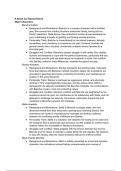A Street Car Named Desire
Major Characters
Blanche DuBois:
● Background and Motivations: Blanche is a complex character with a troubled
past. She comes from a fading Southern aristocratic family, having lost her
family's plantation, Belle Reeve. Her motivations revolve around escaping her
past, maintaining a façade of gentility, and finding security and love.
● Personality Traits: Blanche is characterized by her refined manners, delicate
sensibilities, and a tendency to romanticize the past. However, beneath her
genteel exterior lies a troubled, emotionally unstable woman haunted by a
traumatic past.
● Struggles and Conflicts: Blanche's primary struggle is with reality. She creates
illusions and fantasies to cope with her painful experiences, particularly the loss
of her family and the guilt she feels about her husband's suicide. Her conflicts
with Stanley, rooted in class differences, escalate throughout the play.
Stanley Kowalski:
● Background and Motivations: Stanley represents the working-class, masculine
force that clashes with Blanche's refined, Southern ideals. His motivations are
grounded in asserting dominance, protecting his territory, and maintaining his
position in the social hierarchy.
● Personality Traits: Stanley is portrayed as aggressive, primal, and physically
dominant. He's unapologetically masculine, and his actions often reflect a
disregard for the delicate sensibilities that Blanche embodies. His confrontations
with Blanche reveal a cruel and controlling nature.
● Struggles and Conflicts: Stanley's conflicts with Blanche are heightened by his
suspicions about her past, her interference in his relationship with Stella, and her
attempts to challenge his authority. His actions, particularly towards the end,
contribute to Blanche's descent into madness.
Stella Kowalski:
● Background and Motivations: Stella is Blanche's younger sister, who has
distanced herself from their aristocratic upbringing by marrying Stanley. Her
motivations are rooted in maintaining her marriage and finding a balance
between the conflicting worlds of Blanche and Stanley.
● Personality Traits: Stella is a mediator, torn between her loyalty to her sister and
her husband. She is passionate and sensuous, but her inability to confront harsh
realities makes her susceptible to Stanley's dominance.
● Struggles and Conflicts: Stella grapples with the tension between her love for
Blanche and her desire to maintain a stable family life with Stanley. Her decision
to stay with Stanley after the violent incidents reflects her internal conflict.
Mitch (Harold Mitchell):
● Background and Motivations: Mitch is initially presented as a kind and sensitive
character. His motivations include finding companionship and a sense of
, purpose. He is drawn to Blanche's vulnerability and seeks a meaningful
connection.
● Personality Traits: Mitch is portrayed as a lonely and somewhat socially awkward
character. He is more considerate than Stanley, and his feelings for Blanche
seem genuine. However, he struggles with the revelation of Blanche's past.
● Struggles and Conflicts: Mitch's internal conflict arises when he discovers
Blanche's true history. His decision to break off the relationship is driven by a
sense of betrayal, contributing to Blanche's ultimate downfall.
Minor Characters
Eunice Hubbell:
● Background and Role: Eunice is the neighbor of Stanley and Stella. She provides
a stark contrast to the Kowalski's tumultuous relationship, as she seems to have
a more stable and functional marriage with her husband, Steve. Eunice becomes
a confidante to Stella, offering advice and insights.
● Personality Traits: Eunice is pragmatic and down-to-earth. She serves as a voice
of reason amidst the chaos, often mediating conflicts between Stanley and Stella.
Her interactions with the couple highlight the disparity between their relationship
and hers.
Steve Hubbell:
● Background and Role: Steve is Eunice's husband and is involved in the poker
games that Stanley hosts. While he doesn't play a central role in the unfolding
drama, his character contributes to the portrayal of the working-class
environment in which the story is set.
● Personality Traits: Steve is portrayed as a typical working-class man. His
character, while not deeply explored, adds to the overall atmosphere of the play
and provides a glimpse into the daily lives of the residents in the neighborhood.
Pablo Gonzales:
● Background and Role: Pablo is another poker player in Stanley's circle. Like
Steve, he contributes to the poker night scenes and the depiction of the
working-class social life. His character adds to the overall ambiance of Stanley's
world.
● Personality Traits: Pablo is a minor character, and his traits are not extensively
explored. However, his presence, along with the other poker players, serves to
emphasize the camaraderie and social dynamics within the working-class
community.
Doctor:
● Background and Role: The doctor appears towards the end of the play when
Blanche is institutionalized. He represents the medical establishment and the
culmination of Blanche's descent into madness. His role is symbolic of society's
response to mental health issues.
● Personality Traits: The doctor's character is more symbolic than deeply
developed. He represents the forces that institutionalize and pathologize




